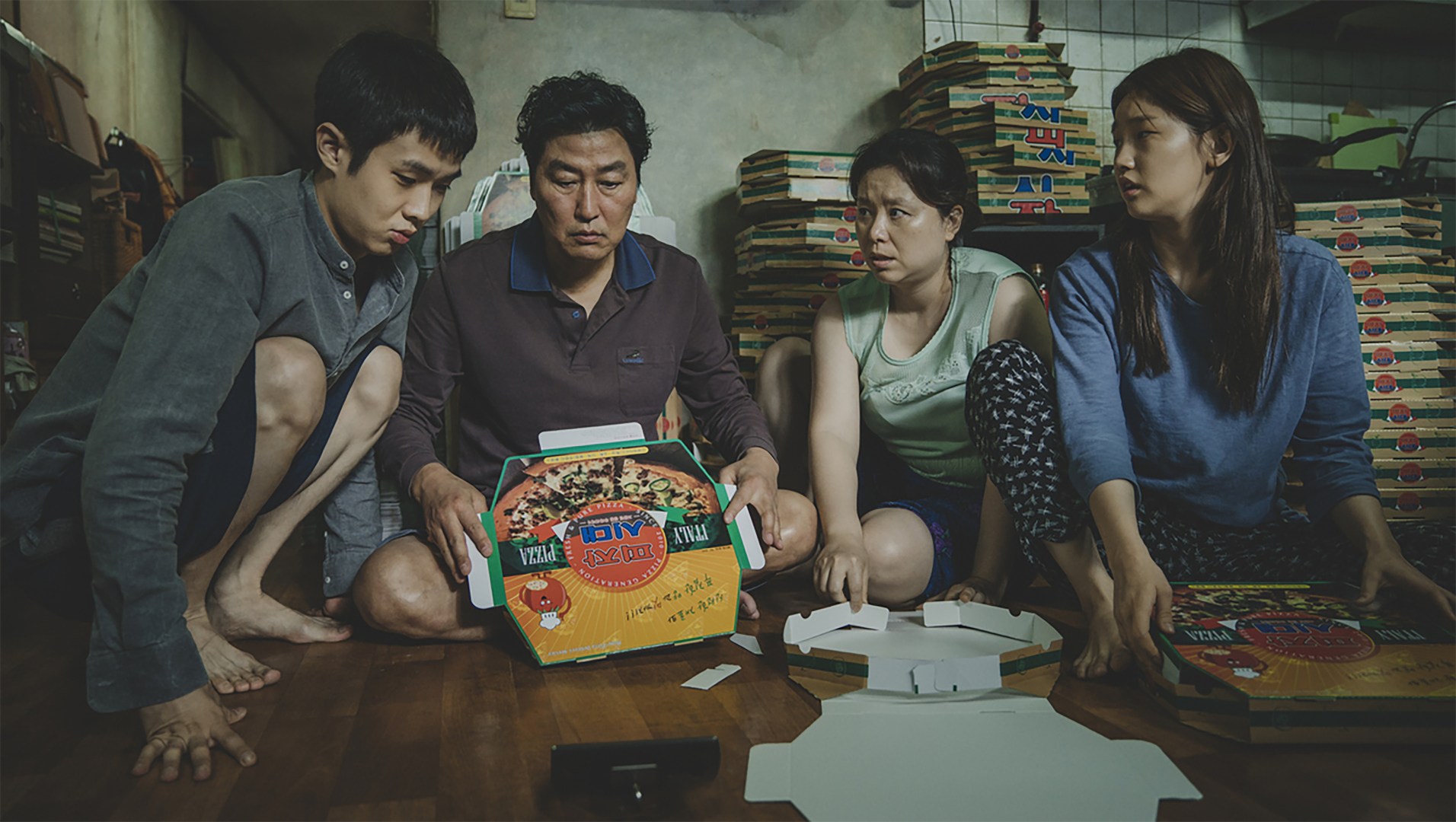My husband and I moved to our current city almost five years ago, and I remember experiencing sticker shock. Everything cost more than we imagined. And unfortunately, we moved as a single-income couple and then became a family of three. We were transplants with no real support system, living life at the bottom of our otherwise affluent suburb.
We spent our first three years living in a half-underground condo. Just above my view of our stairs leading up to the courtyard, I could see mansions across the street. I gawked at them, wondering what kind of people lived there and if we’d ever live in a house of our own. Deep down I knew that those houses, and those lives, would always be beyond my reach.
Imagine my surprise when Parasite opened with a family that also lives half-underground. The Kim family—made up of father Ki-Taek, mother Chung-sook, and a grown son and daughter, Ki-woo and Ki-jeong—are on the fringe of South Korean society. They struggle to put food on the table, working temporary, low-paying jobs and living one disaster away from total destitution. The family is not only poor but forgotten, left to slowly work toward upward mobility or die trying.
However, the family’s fortunes quickly improve after Ki-woo takes over his friend’s cushy private tutoring job for the wealthy Park family. In short succession, the whole Kim family is hired without letting on that they’re related to one another—the daughter faking her credentials as an art therapist, the father taking over from a wrongfully implicated chauffeur, and the mother becoming the new housekeeper after they conspire to remove her predecessor.
The Kims are surprisingly competent in each of their roles. They are not people looking for a handout so much as an opportunity. At one point, Mr. Park, the hands-off patriarch, compliments Mr. Kim by telling him that he “doesn’t ever cross the line.” The line being, we presume, the employee speaking to his employer as if they’re equals and not members of very different classes. Through idyllic scenes of contented employees and well-cared for family, we as viewers are lulled into a sense of security.
But one day the Parks leave for a camping trip, and Mrs. Kim invites her family over to live it up in their employers’ massive and well-stocked home. They take shelter from the night’s downpour and muse over what makes the Parks so nice. Mrs. Kim scoffs, “They are nice because they are rich.” It’s as simple as that. Money makes life easier and kinder to live, even for the sake of others. And if they could just have more of it, virtue would follow. But an unexpected visitor puts those theories to the test.
Without revealing spoilers, the Kims quickly realize how fragile their security is and how little it takes to lose it all. They become calloused in their pursuit of social mobility, hardened toward people they find have it even worse than they do. And while Parasite has won critical acclaim worldwide, seeming to strike a chord with audiences for its raw class commentary, the movie’s message is not clear cut. It’s a dark comedy, but by the end you’re not sure if the joke is on you after all. Are the Kims villains or heroes for trying to engineer their own success? And what happens when a steady job and pay still fall far short of what you need?
Perhaps the movie resonates with viewers because many of us feel the squeeze of being in the middle class. There is always something to aspire to and always something to fear losing. In Proverbs 30:8, Agur son of Jakeh writes, “Give me neither poverty nor wealth; feed me with the food I need” (CSB).
The entire proverb is a cry for humility and a reminder of how quickly we forget our dependence on God. When we’re locked in a race for productivity, efficiency, and the false belief that whoever works hardest will gain the most, there is precious little time to reflect on our true place in the world and who actually holds it all together. And just like the Parks and Kims, we see those with less as threats to our security instead of neighbors who need compassion and understanding.
This truth is felt not only on an individual but a systemic level. In an interview with The Atlantic, director Bong Joon-ho remarks, “… the state of [class] polarization applies not only to Korea but anywhere across the world. [South] Korea has achieved a lot of development, and now it’s a fairly wealthy country, but the richer a country gets, the more relative this gap becomes.”
There are several moments when you realize that even if the Kims worked their entire lives, they could never attain the easy wealth of their employers. The “pull yourself up by the bootstraps” mentality is not enough. Saving and frugality are not enough. After the penultimate disaster for the Kims, patriarch Ki-taek remarks:
You know what kind of plan never fails? No plan. No plan at all. You know why? Because life cannot be planned. Look around you … It doesn't matter what will happen next. Even if the country gets destroyed or sold out, nobody cares.
And indeed, the climax of the movie is completely unpredictable and jarring. Much like a world where the more developed a country is, the more tight-fisted it becomes. Where those who live in abundance operate out of a scarcity mindset, seeing their power as non-negotiable and unwilling to lay it down to lift more people up with them.
But this is the world as it is, not as it could be. And, as Parasite warns, it is the world we’ll keep living in until we start to trust God with what we have instead of seeking what we want.
Jennifer Clark has lived in three countries and is a voracious moviegoer. She holds together her family of four and works for an anti-trafficking ministry.









